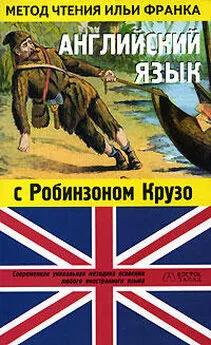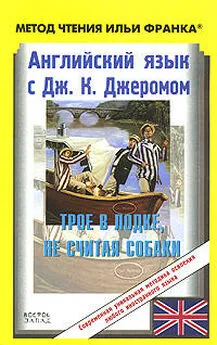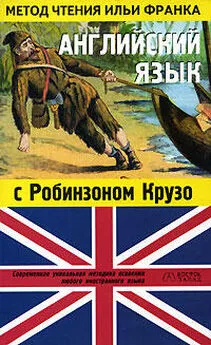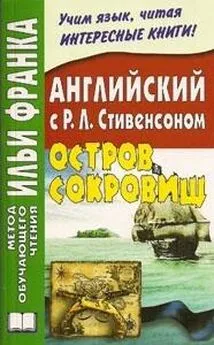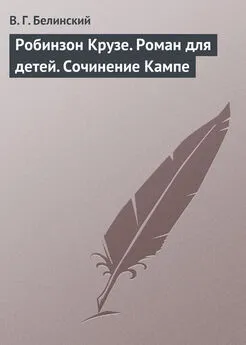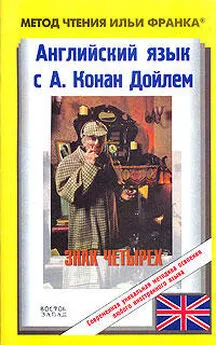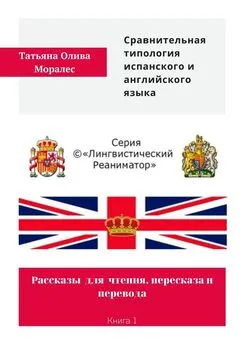James Baldwin - Английский язык с Робинзоном Крузо (в пересказе для детей) (ASCII-IPA)
- Название:Английский язык с Робинзоном Крузо (в пересказе для детей) (ASCII-IPA)
- Автор:
- Жанр:
- Издательство:неизвестно
- Год:неизвестен
- ISBN:нет данных
- Рейтинг:
- Избранное:Добавить в избранное
-
Отзывы:
-
Ваша оценка:
James Baldwin - Английский язык с Робинзоном Крузо (в пересказе для детей) (ASCII-IPA) краткое содержание
Английский язык с Робинзоном Крузо (в пересказе для детей)
Robinson Crusoe Written Anew for Children by James Baldwin
Необыкновенно простой язык. C этой книги хорошо начинать читать по-английски.
Текст адаптирован (без упрощения текста оригинала) по методу Ильи Франка: текст разбит на небольшие отрывки, каждый и который повторяется дважды: сначала идет английский текст с «подсказками» — с вкрапленным в него дословным русским переводом и лексико-грамматическим комментарием (то есть адаптированный), а затем — тот же текст, но уже неадаптированный, без подсказок.
Начинающие осваивать английский язык могут при этом читать сначала отрывок текста с подсказками, а затем тот же отрывок — без подсказок. Вы как бы учитесь плавать: сначала плывете с доской, потом без доски. Совершенствующие свой английский могут поступать наоборот: читать текст без подсказок, по мере необходимости подглядывая в подсказки.
Запоминание слов и выражений происходит при этом за счет их повторяемости, без зубрежки.
Кроме того, читатель привыкает к логике английского языка, начинает его «чувствовать».
Этот метод избавляет вас от стресса первого этапа освоения языка — от механического поиска каждого слова в словаре и от бесплодного гадания, что же все-таки значит фраза, все слова из которой вы уже нашли.
Пособие способствует эффективному освоению языка, может служить дополнением к учебникам по грамматике или к основным занятиям. Предназначено для студентов, для изучающих английский язык самостоятельно, а также для всех интересующихся английской культурой.
Мультиязыковой проект Ильи Франка: www.franklang.ru
От редактора fb2. Есть два способа оформления транскрипции: UTF-LATIN и ASCII-IPA. Для корректного отображения UTF-LATIN необходимы полноценные юникодные шрифты, например, DejaVu или Arial Unicode MS. Если по каким либо причинам вас это не устраивает, то воспользуйтесь ASCII-IPA версией той же самой книги (отличается только кодированием транскрипции). Но это сопряженно с небольшими трудностями восприятия на начальном этапе. Более подробно об ASCII-IPA читайте в Интернете:
http://alt-usage-english.org/ipa/ascii_ipa_combined.shtml
http://en.wikipedia.org/wiki/Kirshenbaum
Английский язык с Робинзоном Крузо (в пересказе для детей) (ASCII-IPA) - читать онлайн бесплатно полную версию (весь текст целиком)
Интервал:
Закладка:
Then I put everything into the tent that needed to be kept dry (но я положил все под навес, что требовало быть хранимым = что нужно было хранить в сухости) . The empty boxes, I piled outside (пустые коробки я сложил снаружи; pile — куча, груда; to pile — складывать, сваливать в кучу) . They made a kind of wall around the tent (они образовали нечто вроде стены вокруг навеса) , like the wall of a fort (подобную стене крепости) .
"This will keep the wild beasts out (это удержит диких зверей снаружи = это предохранит от диких зверей) ," I said.
By this time the day was nearly done (к этому времени день почти закончился) . I spread one of the beds on the ground (я расстелил одну из постелей на земле) . I laid two loaded pistols near its head (я положил два заряженных пистолета около ее изголовья) , and one of the guns by one side of it (и одно из ружей возле нее/сбоку от нее) . Then I crept in (затем я заполз/залез внутрь; to creep — ползать; пробираться) and was soon fast asleep (и скоро крепко заснул: «и был вскоре крепко спящим») .
useful ['ju:sful], another [@'nVD@], grind ['graInd], barrel ['b&r(@)l], musket ['mVskIt], ball [bO:l], gather ['g&D@], clothes ['kl@uDz], hammock ['h&m@k], homeward ['h@umw@d], brought [brO:t], mind ['maInd], acquainted [@'kweIntId], second ['sek(@)nd], cargo ['kA:g@u], task [tA:sk], put [put], wall [wO:l]
THE next morning, when the tide was at its lowest I swam out to the ship again.
There were still many things on board of it that might be useful to me in my island home. I wished to save all that I could.
I climbed up the ship's side just as I had done the day before.
Before looking for anything I made another raft, just like the first one, but smaller. It was not so easy to make, for I had used up all the best planks. It was neither so large nor so strong as the first raft.
In the carpenter's shop I found three bags of nails and a grindstone. I found also a box full of little hatchets and a small barrel of musket balls.
In the captain's room I found six or seven guns, which I had overlooked before, and another keg of powder.
All these things I loaded with much care upon my raft.
Then I gathered up as many clothes as I could find; also a spare sail, a hammock, and some bedding.
The raft was now quite full. The things were not heavy, but they made a large pile.
When the tide turned for the shore, I cut loose and was soon floating homeward.
I had found a good oar in the ship. This I used as a paddle, and I had no trouble in guiding the raft to the right landing place.
I looked to see if the goods were safe which I brought over the day before.
There, on one of my chests, I saw a strange animal sitting. She looked like a wild cat.
As I went toward her, she jumped down and ran a little way. Then she stood still.
I followed. She stood very firm and looked in my face. She looked as though she had a mind to get acquainted.
I pointed my gun at her, and shouted. But she did not care for that.
I had a bit of biscuit in my pocket. This I now tossed toward her. "Take this and begone," I shouted.
It rolled quite close to her nose. She smell of it and ate it. Then she looked up for more.
"Thank you, I have no more to give you," I said.
Whether she understood me, I do not know. But, with that, she turned and marched away.
I now set to work to get my second cargo on shore. It was no easy task, and I had to make many trips to and from the raft.
When everything was safely landed, I made me a little tent with the sail and some poles that I cut.
Then I put everything into the tent that needed to be kept dry. The empty boxes, I piled outside. They made a kind of wall around the tent, like the wall of a fort.
"This will keep the wild beasts out," I said.
By this time the day was nearly done. I spread one of the beds on the ground. I laid two loaded pistols near its head, and one of the guns by one side of it. Then I crept in and was soon fast asleep.
I FIND A GREAT STORE OF THINGS
(я нахожу большой склад вещей)
THE next day I went to the ship again (на следующий день я вновь пошел к кораблю) . This I kept up for more than a week (это я продолжал делать более недели: «больше, чем неделю»; to keep up — поддерживать; соблюдать, придерживаться) .
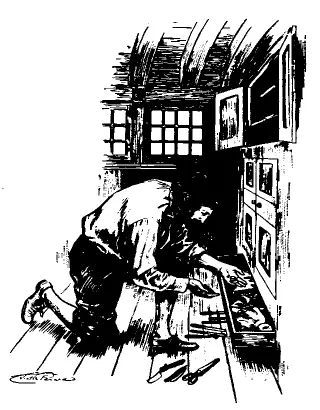
Every day I brought a load of things to the shore (каждый день я привозил груз вещей на берег; to bring — приносить; привозить) .
At last there was nothing left (в конце концов не было ничего оставшегося: «не было ничего оставлено»; to leave — оставлять) that one pair of hands could lift (что могла поднять пара рук) . But I do believe that if the fine days had held out (я действительно верю, что, если бы хорошие дни сохранились) , I would have brought away the whole ship (я бы вынес весь корабль) .
You ask how I would have done that (вы спрашиваете, как я бы сделал это) ? I would have cut it into pieces and brought one piece at a time (я бы разрезал его на части и приносил бы одну часть за раз) .
The last thing that I found was a secret drawer in the cabin (последней вещью, которую я обнаружил, был секретный /выдвижной/ ящик в каюте; drawer — /выдвижной/ ящик /стола, комода/; to draw — тащить, тянуть) . In that drawer there was some money (в ящике было какое-то количество денег) .
A part of this money was in gold pieces (часть этих денег была в золотых слитках) —"pieces of eight," we called them (мы называли их песо: «кусками /из/ восьми»; piece of eight — старинное испанское песо, равнявшееся восьми реалам) . The rest was in silver (остальная часть была серебром; rest — остаток, остальная часть) .
I smiled to myself (я улыбнулся себе = про себя/в мыслях) when I saw this money (когда увидел эти деньги) .
"O useless stuff (бесполезная вещь; stuff — материя, материал; дрянь, хлам) !" I cried (воскликнул я) . '"What are you good for now (что пользы от вас сейчас) ? You are not worth picking up (вы не стоите того, чтобы подобрать вас) . This little old knife (старый ножик) is worth much more (стоит много большего/обладает гораздо большей ценностью; worth — стоящий) . I have no manner of use for you (я не знаю, как вас использовать: «не имею способа использования вас»; manner — способ, метод; образ действий; манера) . Lie there, where you are (лежите там, где вы есть) , and go to the bottom (и идите на дно) ."
I was about to leave the cabin (я собирался уже покинуть кабину; to be about /+ инфинитив/ — быть готовым что-л. сделать) when I looked around again (когда я вновь ооглянулся) . The bright pieces were so pretty (яркие слитки были столь красивы) that I could not bear to leave them (что я не мог вынести оставить их = просто не смог их оставить) .
So I put them all in a strong bag (так что я поместил их в крепкую сумку) and tied it around my waist like a belt (и завязал ее вокруг талии, как ремень) .
"It will not do (не пойдет = не годится) to throw good money away (выбрасывать добрые деньги) ," I said.
When I went up on deck (когда я поднялся на палубу) the wind was blowing hard (ветер дул сильно) . Dark clouds were beginning to cover the sky (темные облака начинали покрывать небо) . The waves were rolling high (волны поднимались: «катились» высоко) . A storm was coming (надвигалась буря) .
I saw that it was time for me to hurry back to the shore (я увидел = понял, что было самое время для меня поспешить обратно к берегу) .
I let myself down into the water (я спустился в воду: «пустил себя вниз в воду») and began to swim (и начал плыть = поплыл) . The sea was rough (море было неспокойно/волновалось; rough — грубый; неровный; бурный /о море/) . The money was heavy (деньги были тяжелыми) .
I hastened home to my little tent (я поспешил домой к моему маленькому навесу) . The storm had already begun (шторм уже начался) .
last [lA:st], secret ['si:krIt], drawer ['drO:@], lie ['laI], waist ['weIst], cloud ['klaud], hasten ['heIs(@)n], already [O:l'redI]
THE next day I went to the ship again. This I kept up for more than a week.
Every day I brought a load of things to the shore.
At last there was nothing left that one pair of hands could lift. But I do believe that if the fine days had held out, I would have brought away the whole ship.
You ask how I would have done that? I would have cut it into pieces and brought one piece at a time.
The last thing that I found was a secret drawer in the cabin. In that drawer there was some money.
A part of this money was in gold pieces—"pieces of eight," we called them. The rest was in silver.
I smiled to myself when I saw this money.
"O useless stuff!" I cried. '"What are you good for now? You are not worth picking up. This little old knife is worth much more. I have no manner of use for you. Lie there, where you are, and go to the bottom."
I was about to leave the cabin when I looked around again. The bright pieces were so pretty that I could not bear to leave them.
Читать дальшеИнтервал:
Закладка:
